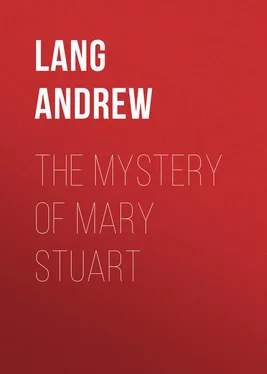Andrew Lang - The Mystery of Mary Stuart
Здесь есть возможность читать онлайн «Andrew Lang - The Mystery of Mary Stuart» — ознакомительный отрывок электронной книги совершенно бесплатно, а после прочтения отрывка купить полную версию. В некоторых случаях можно слушать аудио, скачать через торрент в формате fb2 и присутствует краткое содержание. Жанр: foreign_antique, foreign_prose, на английском языке. Описание произведения, (предисловие) а так же отзывы посетителей доступны на портале библиотеки ЛибКат.
- Название:The Mystery of Mary Stuart
- Автор:
- Жанр:
- Год:неизвестен
- ISBN:нет данных
- Рейтинг книги:4 / 5. Голосов: 1
-
Избранное:Добавить в избранное
- Отзывы:
-
Ваша оценка:
- 80
- 1
- 2
- 3
- 4
- 5
The Mystery of Mary Stuart: краткое содержание, описание и аннотация
Предлагаем к чтению аннотацию, описание, краткое содержание или предисловие (зависит от того, что написал сам автор книги «The Mystery of Mary Stuart»). Если вы не нашли необходимую информацию о книге — напишите в комментариях, мы постараемся отыскать её.
The Mystery of Mary Stuart — читать онлайн ознакомительный отрывок
Ниже представлен текст книги, разбитый по страницам. Система сохранения места последней прочитанной страницы, позволяет с удобством читать онлайн бесплатно книгу «The Mystery of Mary Stuart», без необходимости каждый раз заново искать на чём Вы остановились. Поставьте закладку, и сможете в любой момент перейти на страницу, на которой закончили чтение.
Интервал:
Закладка:
Moray continued, after he was pardoned for his rebellion, to add estate to estate. He was a pensioner of England; from France he received valuable presents. His widow endeavoured to retain the diamonds which Mary had owned, and wished to leave attached to the Scottish crown. His ambition was probably more limited than his covetousness, and the suspicion that he aimed at being king, though natural, was baseless. While he must have known, at least as well as Mary, the guilt of Morton, Lethington, Balfour, Bothwell, and Argyll, he associated familiarly with them, before he left Scotland prior to Mary’s marriage with Bothwell, and he used Bothwell’s accomplices, including the Bishop who married Bothwell to Mary, in his attack on the character of his sister. Whether he betrayed Norfolk, or not, was a question between David Hume and Dr. Robertson. If to report Norfolk’s private conversation to Elizabeth is to betray, [13] The private report is in the Lennox MSS.
Moray was a traitor, and did what Lethington scorned to do. But Moray’s most remarkable quality was caution. He always had an alibi . He knew of Riccio’s murder – and came to Edinburgh next day. He left Edinburgh in the morning, some sixteen hours before the explosion of Kirk o’ Field. He left Edinburgh for England and France, twelve days before the nobles signed the document upholding Bothwell’s innocence, and urging him to marry the Queen. He allowed Elizabeth to lie, in his presence, and about her encouragement of his rebellion, to the French Ambassador. His own account of his first interview with his sister, in prison at Loch Leven, shows him as an adept in menace cruelly suspended over her helpless head. The account of Mary’s secretary, Nau, is much less unfavourable to Moray than his own, for obvious reasons.
As Regent he was bold, energetic, and ruthless: the suspicion of his intention to give up a suppliant and fugitive aroused the tolerant ethics of the Border. A strong, patient, cautious man, capable of deep reserve, in his family relations, financial matters apart, austerely moral, Moray would have made an excellent king, but as a Queen’s brother he was most dangerous, when not permitted to be all powerful. He could not have rescued Darnley, or saved Mary from herself, without risks which a Knox or a Craig would certainly have faced, but which no secular leader in Scotland would have dreamed of encountering. Did he wish to save the doomed prince? A precise Puritan, he was by no means like a conscience among the warring members of the body politic. Mary rejoiced at the news of his murder, pensioned the assassin, and, of all people, chose an Archbishop as her confidant.
Reviled by Mary’s literary partisans, Moray to Mr. Froude seemed ‘noble’ and ‘stainless.’ He was a man of his time, a time when every traitor or assassin had ‘God’ and ‘honour’ for ever on his lips. At the hypocrisies and falsehoods of his party, deeds of treachery and blood, Moray ‘looked through his fingers.’
Infinitely the most fascinating character in the plot was William Maitland, the younger, of Lethington. The charm which he exercised over his contemporaries, from Mary herself to diplomatists like Randolph, and men of the sword like Kirkcaldy of Grange, has not yet exhausted itself. Readers of Sir John Skelton’s interesting book, ‘Maitland of Lethington,’ must observe, if they know the facts, that, in presence of Lethington, Sir John is like ‘birds whom the charmer serpent draws.’ He is an advocate of Mary, but of Mary as a ‘charming sinner.’ By Lethington he is dominated: he will scarcely admit that there is a stain on his scutcheon, a scutcheon, alas! smirched and defaced. Could a man of to-day hold an hour’s converse with a man of that age, he would choose Lethington. He was behind all the scenes: he held the threads of all the plots; he made all the puppets dance at his will. Yet by birth he was merely the son of the good and wise poet and essayist, Sir Richard Lethington, laird of a rugged tower and of lands in Lauderdale, pastorum loca vasta . He was born about 1525, had studied in France, and was a man of classical culture, without a touch of pedantry. As early as 1555, we find him arguing after supper with Knox, on the lawfulness of bowing down in the House of Rimmon, attending the Mass. Knox had the last word, for Lethington was usually tactful; in argument Knox was a babe in the hands of the amateur theologian. Appointed Secretary to Mary of Guise, in the troubled years of the Congregation, Lethington deserted her and joined the Lords. He negotiated for them with Cecil and Elizabeth, and almost to the last he was true to one idea, the union of the crowns of England and Scotland in peace and amity.
Through all the windings of his policy that idea governed him if not thwarted by personal considerations, as at the last. Before Mary’s arrival in Scotland he hastened to make his peace with her, and her peace and trust she readily granted. Lethington was the spoiled child of the political world, ‘the flower of the wits of Scotland,’ as Elizabeth styled him; was reckoned indispensable, was petted, caressed, and forgiven. He not only withstood Knox, in the interests of religious toleration, but he met him with a smile, with the weapons of persiflage , which riddled and rankled in the vanity of the Reformer. Lethington was modern to the finger-tips, a man of to-day, moving among the bravos, and using the poisoned tools, of an age of violence and perfidy.
Allied by marriage to the Earl of Atholl, in hours of peril he placed the Tay and the Pass of Killiecrankie between himself and the Law.
From the time of his restoration to Mary’s favour after Riccio’s murder, his part in the obscure intrigue of Darnley’s murder, indeed all his future course, is a mystery. Being now over forty he had long wooed and just before the murder had won the beautiful Mary Fleming, of all the Four Maries the dearest to the Queen. His letter to Cecil on his love affair is a charming interlude. ‘He is no more fit for her than I to be a page,’ says the brawny, grizzled, Kirkcaldy of Grange. His devotion is often ridiculed by perhaps envious acquaintances. But, from September 20, 1566, Lethington was deep in every scheme against Darnley. He certainly signed the murder ‘band.’ He was with Mary at Stirling (April 22-23, 1567) when, if he did not know that Bothwell meant to carry her off (and perhaps he really did not know), he was alone in his ignorance among the inner circle of politicians. Yet he disliked the marriage, and was hated by Bothwell. On the day of Mary’s enlèvement , Bothwell took Lethington, threatened him, and, but for Mary, would probably have slain him. Passive as to herself, she defended the Secretary with royal courage. Days darkened round the Queen, the nobles rose in arms. Lethington, about June 7, fled first to Livingstone’s house of Callendar, then joined Atholl and the enemies of the Queen. We shall later attempt to unfold the secret springs of his tortuous and fatal policy.
Lethington had been the Ahithophel of the age. ‘And the counsel of Ahithophel, which he counselled in those days, was as if a man had enquired at the oracle of God.’ But the Lord ‘turned the counsel of Ahithophel into foolishness.’ He wrought against Mary, just after she saved his life from the dagger of Bothwell, some secret inexpiable offence, besides public injuries. Fear of her vengeance, for she knew something fatal to him, drove him into her party when her cause was desperate. He escaped the gallows by a natural death; he had long been smitten by creeping paralysis. Mary hated him dead, as after his betrayal of her she had loathed him living.
Mary was sorely bested, then, between the Young Fool, the Furious Man, the Puritan brother, and Michael Wylie (Machiavelli) as the Scots nicknamed Lethington. She was absolutely alone. There was no man whom she could trust. On every hand were known rebels, half pardoned, half reconciled. Feuds, above all that of her husband and his clan, the Lennox Stewarts, with the nearest heirs of the crown, the Hamiltons, broke out eternally. The Protestants hated her: the Preachers longed to drag her down: the English Ambassadors were hostile spies. France was far away, the Queen Mother was her enemy: her kindred, the Guises, were cold or powerless. She saw only one strong man who had been loyal, one protector who had served her mother, and saved herself. That man was Bothwell.
Читать дальшеИнтервал:
Закладка:
Похожие книги на «The Mystery of Mary Stuart»
Представляем Вашему вниманию похожие книги на «The Mystery of Mary Stuart» списком для выбора. Мы отобрали схожую по названию и смыслу литературу в надежде предоставить читателям больше вариантов отыскать новые, интересные, ещё непрочитанные произведения.
Обсуждение, отзывы о книге «The Mystery of Mary Stuart» и просто собственные мнения читателей. Оставьте ваши комментарии, напишите, что Вы думаете о произведении, его смысле или главных героях. Укажите что конкретно понравилось, а что нет, и почему Вы так считаете.












